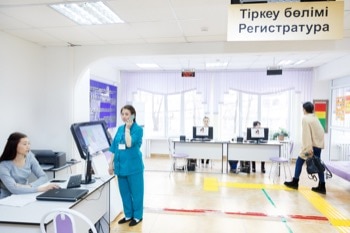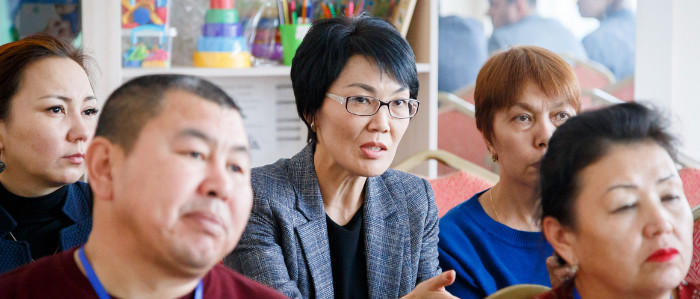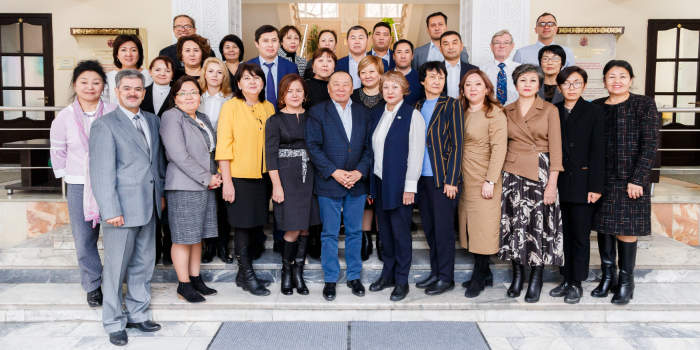Seeing patient-centered care in action in nearby Kazakhstan leaves Kyrgyz delegation deeply impressed
In November 2019, a 17-person delegation from Kyrgyzstan travelled to Almaty to learn about Kazakhstan’s approach to patient-centered primary health care services for mothers and children. Seeing the delivery of this innovative approach on the ground and being able to discuss it with their Kazakh colleagues was an eye-opener for the Kyrgyz health experts.
The study tour was jointly organised by WHO’s European Center for Primary Health Care and the Promotion of Perinatal Health project, implemented by Deutsche Gesellschaft für Internationale Zusammenarbeit (GIZ) on behalf of the Federal Ministry for Economic Development and Cooperation (BMZ). The tour’s aim was to assess whether elements of the patient-centered primary care model could be applicable in Kyrgyzstan. In line with the 2018 Astana Declaration, the Government of Kyrgyzstan is working to strengthen primary health care services to ensure that all its citizens are able to enjoy the highest possible attainable standard of health. The programme for the visit included technical meetings with experts, visits to health facilities in the city of Almaty and the surrounding region, and a high-level round table with representatives of the government of Kazakhstan.
A health system oriented on the needs of patients

The study tour participants came away impressed by Kazakhstan’s strong commitment to strengthening primary health care, and noted that the focus on patients was immediately apparent in each of the health care facilities they visited. Long opening hours, electronic queues and electronic medical records all contribute to a convenient and efficient experience for patients seeking care.
A color-coded triage system for sorting patients based on the urgency of their condition ensures that they are seen in a timely manner and receive appropriate care from the right personnel. By reducing potentially harmful delays, the sorting system helps to improve health outcomes. It also helps health care workers to work more efficiently, thereby increasing the quality of care they provide to patients.
An effective interdisciplinary teamwork approach

Team work is the basis of primary health services in Kazakhstan. Work processes are well organised and the roles and responsibilities of different cadres are clearly defined. Health system reforms have elevated the role of nurses in Kazakhstan: they are now the main point of contact for members of the public and coordinate health services. Nurses work with a great deal of autonomy, consulting directly with patients and providing them with basic services. This division of labour helps to minimise the routine work performed by family doctors and gives them more time to concentrate on complex cases.
Social workers and psychologists work alongside clinical staff as part of multi-disciplinary primary care teams. Visiting nurses make daily home visits to pregnant women, new mothers and newborns who might otherwise not receive medical and social services, allowing them to identify and act upon issues quickly and efficiently. The inclusion of these other cadres into the primary health model contributes to the goal of Universal Health Coverage in Kazakhstan by extending the reach of health promotion services, encouraging healthy lifestyles and attracting patients for preventive health screenings.
Considering opportunities for further cooperation

At a round table discussion held at the WHO office on the final day of the study tour, participants from both countries had the opportunity to exchange impressions and to consider opportunities for further cooperation.
Dr Anara Eshkhodzhaeva, the head of the Department of Medical Service Delivery and Drug Policy of MoH, noted that that Kyrgyz delegation was nothing short of amazed by the changes that are currently taking place in Kazakhstan. ‘To see a primary health care system function so effectively is very inspiring,’ she said, ‘The joint teamwork approach you have introduced is bringing about impressive results. This is something our country can adopt.’
Nazgul Cholumova, the head of the Department for the Development of Social Services for Families and Children at Kyrgyzstan’s Ministry of Labor and Social Development, was struck by the difference that an integrated approach to care can make for patients and social workers alike. ‘Social workers in our two countries do the same jobs,’ she said, ‘but in Kyrgyzstan when a child needs a medical examination or a consultation with a psychologist, the social worker and the child have to run around to find these specialists. Here I have seen what an integrated approach can look like, and how it allows the patient to be an equal partner in all aspects of treatment and care.’

This is what study tours are all about
For the GIZ advisors of the Promotion of Perinatal Health project the learning that happened during this study tour – not just for the representatives of the Kyrgyz Ministry of Health but also for themselves – exceeded all expectations. ‘We’d heard about the positive changes in primary health care in Kazakhstan, but we didn’t imagine that so much had been done,’ said Marat Kaliev, a consultant working with GIZ. ‘We were expecting small changes to the Soviet model, but instead saw a modern system of integrated services, with a multi-disciplinary team working for the benefit of patients.’
Allowing counterparts to see, critically review and discuss innovative approaches with peers who implement them on a daily basis is one important component of German technical cooperation. The closer the cultural, historic and linguistic links between the delegation and the country they visit, the more effective is the learning experience. Dr Arnoldas Jurgurtis of the WHO’s European Center for Primary Health Care in Almaty thanked the ministries of health from both countries and pledged the Center’s support for their further cooperation.
January 2020

